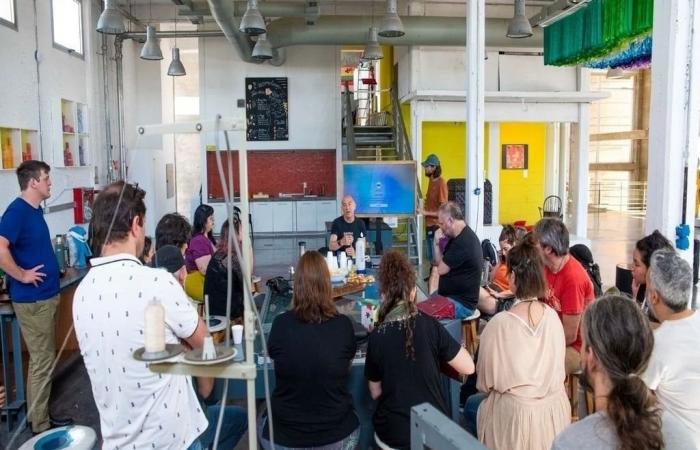References from the audiovisual industry expressed concern after months of lobbying with provincial deputies, not observing progress in the treatment of the project known as the “Cinema Law”, which seeks to regulate this sector that generates formal jobs and generates foreign currency for the province.
The director and producer of the Santa Fe Producers Association (Appas), Pamela Carlino, and the union pro-secretary of the Argentine Film Industry Union (Sica) in Santa Fe and the region, Carlos Welti, gave some details in dialogue with Mirador.
They highlighted that “producing companies and workers have been working for the hierarchy, development and sustained growth of the activity”, about which they recalled that “it has the rank of Industry in the province, and that is why the enforcement authority will be the Ministry of Productive Development “, and for its development to be industrial in fact, “much more than a declaration is needed.”
The objective of the Cinema Law is to develop the economic and cultural potential of this sector, based on formal development funds, reopening of movie theaters, scholarships for students, a provincial international festival, a registry with statistics on the sector, a cinematheque. preservation and dissemination of heritage, clear dissemination and distribution policies, and the creation of an advisory council.
This idea has been simmering for more than ten years, and in 2022 the Santa Fe Film Law Commission was formally formed, with more than 80 filmmakers and audiovisual workers, unions and chambers of this industry, from which the content of the law was thought out. And in 2023 it was entered by Matilde Bruera in the Chamber of Deputies, with the support of 11 other legislators.
With the change of the legislative body after the elections, the dialogues with the new deputies continued, and there are intentions of treatment on the part of some, as they let the filmmakers know. However, concern persists due to the lack of agreements for its treatment so that it obtains an opinion in the Culture commission, to then go through the Budget commission and be dealt with in an ordinary session before losing parliamentary status in November.
“All the deputies with whom we have been speaking expressed their support, but it remains undebated, and in November it loses parliamentary status, which would mean losing more time by raising the bill again,” said Carlos Welti, while Pamela reviewed : “Last year we understood that we had to wait, due to the electoral changes, and now this year they began to meet in May. We need the debate to advance and the opinion of Culture to come out, advance in the Budget, so that it reaches the Campus and then is incorporated into the 2025 Budget in the Provincial Treasury.”
Both agreed that, at the national level, Santa Fe is among the six provinces that have the most audiovisual production. And at the same time they understand that, without its own law, this industry can be left out of the picture. “We need to make visible that, despite the recession, the sector is consolidated, works actively, has full capacity, also employs suppliers, and there are audiovisual productions in all the territories of the province,” they agreed.
In addition, they highlighted that it is an industry with a lot of awareness that contracts are regulated, as well as its suppliers (catering, transportation, hotels, rentals, workshops of various trades and professional services). And it is a notable issue, since “the foreign currency generated in each film remains in the region, because all those suppliers are from here.”
Asked about what happens when there is no regulation, Welti specified that it does not allow companies a co-production strategy, as is done by provinces that have their Film Law such as Mendoza, Córdoba or Buenos Aires. “Ours is a human resource that is trained and is being trained with various film schools, and for them to have work, it is necessary to promote it,” he said.
The law will generate foreign exchange for the region, possibilities of soft loans, contests, scholarships, agreements with municipalities, a formal development fund. And the proposal is that an advisory council for this industry be created, within the Ministry of Productive Development, and in which officials from the Ministry of Culture, who already have the expertise, participate.
And it will contribute to other activities that generate resources in the value chain in the sectors of transportation, hospitality, construction, blacksmithing and carpentry, unions, gastronomy, real estate activity, among others. The film industry is considered within the well-known “economy, added to the fact that it is a non-polluting activity, generating enormous added value with very low ecological impact. “Its product is intangible since it is never consumed, and it is a capital that exceeds the economic, which must be encouraged for its production and protected for its essential preservation,” is highlighted in the submitted bill, which this media accessed.
Pamela highlighted that this sector was incorporated as an industry at the end of 2018 by the then governor Miguel Lifschitz, and that the provincial Filming commission (for the promotion of provincial audiovisual productions in the world) was created from there. That is why the control body of this law, when it comes out, will be the Ministry of Production.
Carlos pointed out that “as it has the status of an industry, what is sought is to have the same support as any industry, such as lines of credit to be able to invest, because this sector is not a hobby as one thinks,” and he added: “There are hundreds of families that depend on job creation.”
Pamela added in this sense: “That a sector with very specific technical training in sound, photography, editing, etc. and with a lot of experience. Some of these, hired by international productions that have come to film in the territory in recent years, like Argentina, 1985.”
Despite the situation of the brakes on Incaa subsidies, which are essential for producing national cinema and for its distribution, they highlighted that there are many filmings that come from last year that remain active, so in the coming months they will be completed. create multiple movies.
On the other hand, beyond the key role of Incaa, both agree on the importance of private investment. “We have also been strengthening links with the private sector, and regarding these agreements, legislation is necessary to strengthen these links formally,” Carlino highlighted.
This 2024, even with recession and inflation, production continues, although the perception from Appas and Sica is that “they are slower, with investment peaks in productions and stops.” It happens that in recent years the province has had a boom in film productions: since 2022 in the Sica union it has been recorded that more than 600 jobs have been generated in feature films and another more than 600 in advertising.
The deficit they observed is in the development of more consistent suppliers, as there is no continuity between productions. “The World Bank itself expressed that in this sector every peso invested ends up injected into the territory in more than seven suppliers, such as catering, textile workshops, set design workshops, costume designers, transfers and rentals,” Welti explained, but noted: “The problem with suppliers is that, without continuity of work, they do not end up fully specializing.”
Below are all the job positions by category in this industry: production manager; production assistant; Production Assistant; location manager; location assistant; director’s assistant; continuous; 1st and 2nd assistant directors; casting direction; casting assistant; direction of photography; HD technician; cameraman; 1st and 2nd camera assistant; key grip; grip; grip assistant; video assist, film photographer; gaffer; head reflector; reflector foreman; generator operator; art direction; scenographer; air freshener; set design assistant; costume designer; wardrobe assistant; Dressmaker; prop man; carpenter; prop assistant; producer; head of makeup; peignoir; makeup and hair styling assistant; sound direction; sound assistant; sound post/mixer direction; dialogue editor; environment and effects editor; collator; collating helper; negative cutter; and apprentice.
While, as mentioned previously, the audiovisual industry generates work for outsourced sectors, and these are: catering; transport; hospitality; rentals; textile workshops; carpentry workshops; blacksmith workshops; technological inputs; and insurance. As well as the following professional services: accountants; lawyers; translators; archive material, research and connectivity managers.
ROSARY BEADS
More news on this topic






